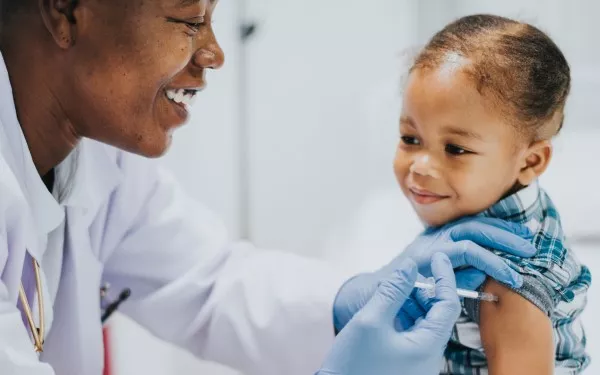
Current issues
The UK’s childhood vaccination programme is one of the most successful in the world with overall high rates of vaccine uptake and low disease incidence. However, uptake of childhood vaccinations are currently below the World Health Organisation’s (WHO) targets with two issues of particular concern:
- There are significant inequalities in vaccine uptake between population groups and geographical areas. For example, uptake of the 1st dose of MMR vaccine for 24-month-olds in Hackney is 32.3% lower than in the highest uptake area, in South Tyneside1.
- There has been a small but consistent decline in uptake of all childhood vaccines each year over the past decade, exacerbated by the pandemic. In 2021-22, uptake of the primary vaccine course currently stands at 91.8% at 12 months of age in England.2
There are many reasons for these inequalities and the decline in overall uptake. Factors include pressure on immunisation services, reduced public health staffing capacity, persisting challenges following the introduction of a new NHS immunisation programme in 2013, missed opportunities to vaccinate children due to prolonged school closures from the Covid-19 pandemic, all making it hard for some groups to access services. We know that vaccine hesitancy or antivaccine sentiment does not contribute greatly to this decline3, yet in the media, coverage of the decline in vaccine uptake is often reported as being due to ‘anti-vaxxers’. For parents/carers with any existing doubts or concerns about the safety, efficacy or necessity for vaccination, such coverage can only serve to reinforce these doubts.
Potential for large measles outbreak in London
Due to years of sub optimal uptake of the MMR vaccine in London, the build up of numbers of susceptible CYP and young adults now provides the potential for a large outbreak of measles. Unless vaccine uptake improves considerably, it is possible that 40,000-160,000 cases of measles could affect the Londoners4. Measles is a serious disease which can result in many hospitalisations, long term health complications and even death. As we head into winter, this will put extra pressure on an already overstretched NHS. We have the means to minimise this predicted outbreak by ensuring children and young people have had at least one dose (ideally two) of the MMR vaccine.
Updates to the childhood vaccination programme
Changes to some of the childhood vaccination programme has been announced this year, which are important to be aware of to share with your patients and colleagues:
HPV
From 1 Sept 2023 the HPV vaccine programme for eligible young people at 12 to 13 years will include one dose of HPV vaccine rather than the current two doses5. HPV vaccination programmes have resulted in reductions in rates of cervical cancer and infections caused by HPV. Evidence shows the protection afforded by one dose of vaccine is as robust as two and is recommended by the WHO. This change also applies to gay, bisexual and other men who have sex with men (GBMSM) aged under 25 years, but not to those who are immunocompromised. This change has already been implemented in Scotland. Many young people missed out on the HPV vaccine due to prolonged school closures by the pandemic so there should also be focus on the continued catch up for this group.
Flu
This year the flu vaccine will now be offered to all children aged two years to less than 18 years6. Don’t forget about children aged six months to two years with chronic health conditions who should be offered inactivated vaccine. They are at greater risk of severe disease and yet vaccine uptake is consistently poor, despite often being seen in paediatric settings.
RSV
Currently, the only protection offered to prevent RSV is a short acting monoclonal antibody, requiring multiple dose during the RSV season7. The JCVI has recommended that a RSV programme should be developed for infants to reduce the risk of them being hospitalised and help ease winter pressures on the NHS.
How to improve uptake
Vaccine uptake could be improved by ensuring easier and more flexible access to families. This includes in hospital settings where paediatricians and other child health professionals should be using their contacts to check vaccine status and offer vaccination where needed or communicating this with general practice. In addition, more recognition should be given to the role the individual’s healthcare professional as a trusted source of vaccination information.
The UK’s vaccination programme is highly successful. However, recent setbacks have meant that action needs to be taken urgently to prevent ill health and reduce the risk of outbreaks of potentially fatal diseases by improving vaccine uptake rates and ensuring catch-up vaccination for those who have missed out. It is the duty of all healthcare professionals looking after children and young people to contribute to this effort.
- 1NHS Digital (2022) Childhood Vaccination Coverage Statistics – England, 2021-22 https://digital.nhs.uk/data-and-information/publications/statistical/nh…
- 2NHS Digital (2022) Childhood Vaccination Coverage Statistics – England, 2021-22 https://digital.nhs.uk/data-and-information/publications/statistical/nh…
- 3RCPCH (2020) Vaccination in the UK: position statement, https://www.rcpch.ac.uk/resources/vaccination-uk-position-statement
- 4UKHSA (2023). Risk assessment for measles resurgence in the UK https://assets.publishing.service.gov.uk/government/uploads/system/uplo…
- 5NHS England and UK Health Security Agency (2023). HPV vaccination programme: changes from September 2023 letter. https://www.gov.uk/government/publications/hpv-vaccination-programme-ch…
- 6DHSC, NHSE, UKHSA (2023). Statement of amendment to the annual flu letter for 2023-2024 – 3 July 2023. https://www.gov.uk/government/publications/national-flu-immunisation-pr…
- 7DHSC (2023) Respiratory Syncytial Virus (RSV) Immunisation Programme. JCVI advice, 7 June 2023 https://www.gov.uk/government/publications/rsv-immunisation-programme-j….










